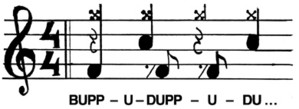
D-beat
D-beat (also known as Discore, kängpunk, Discrust,[1] and crust-beat[2]) is a style of hardcore punk, developed in the early 1980s by imitators of Discharge, after whom the genre is named, as well as a drum beat characteristic of this subgenre. D-beat is known for its "grinding, distorted and brutally political" sound.[1] Discharge may have themselves inherited the beat from Motörhead and the Buzzcocks. D-beat is closely associated with crust punk, which is a heavier, more complex variation. The style was particularly popular in Sweden, and developed there by groups such as Crude SS, Anti Cimex, Mob 47, and Driller Killer. Other D-beat groups include Doom and the Varukers from the UK; Disclose from Japan; Crucifix and Final Conflict from the U.S.; Ratos de Porão from Brazil; and MG15 from Spain. While the style initially developed in the early 1980s, a number of new groups working within the subgenre emerged in the mid-1990s. These include the Swedish groups Wolfbrigade, Totalitär, Avskum, Skitsystem, and Disfear.
D-beat
- Discore
- kängpunk
- Discrust
Early 1980s, England and Sweden
Characteristics[edit]
Vocals and lyrics[edit]
The vocal content of D-beat tends towards shouted slogans. The style is distinguished from its predecessors by its minimal lyrical content and greater proximity to heavy metal. D-beat bands typically have anti-war, anarchist messages and closely follow the bleak nuclear war imagery of 1980s anarcho-punk bands. Rock journalist Robbie Mackey described D-beat as characterized by "hardcore drumming set against breakneck riffage and unintelligible howls about anarchy, working-stiffs-as-rats, and banding together to, you know, fight."[40]
Vocals in crust punk are often shrieked or shouted, and may be shared between two or more vocalists. The lyrical content of crust punk tends to be bleak and nihilistic, yet politically engaged. Crust punk songs are often about nuclear war, militarism, animal rights, police, personal grievances, oppressive states and fascism. Amebix were also interested in various forms of mysticism and Gnosticism.[15] Malcolm "Scruff" Lewty, guitarist and vocalist of Hellbastard, describes the distinction between metal and crust punk lyrics: